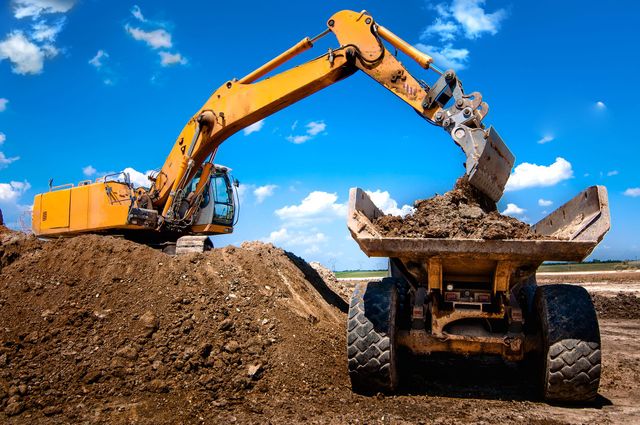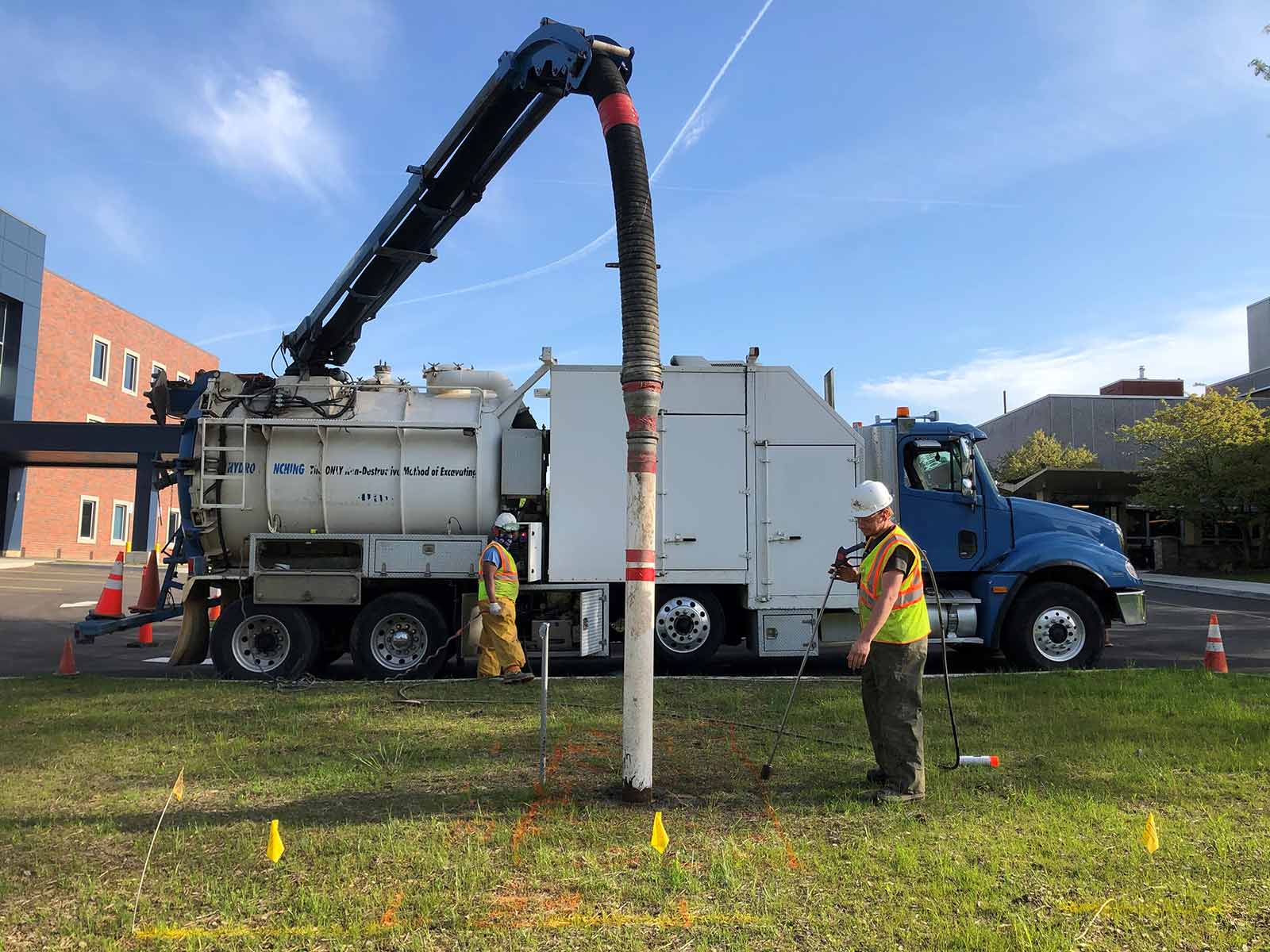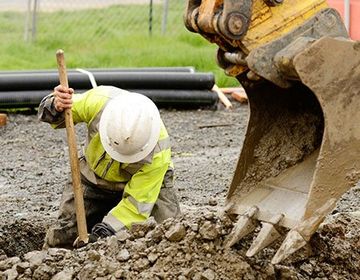Ideal Dump Truck Companies in Ohio - Top-Rated Dump Truck Providers
Ideal Dump Truck Companies in Ohio - Top-Rated Dump Truck Providers
Blog Article
Extensive Exploration: The Scientific Research Behind Superior Excavation Practices
The world of excavation methods is a domain where science intertwines with workmanship to uncover the mysteries concealed below the earth's surface. From ancient hand tools to contemporary hydraulic excavators, the development of excavation methods has been a testament to human resourcefulness and technical innovations. Nonetheless, what genuinely sets exceptional excavation practices apart is a deep understanding of geological concepts, combined with the use of advanced tools and methodologies. By exploring the scientific research behind these methods, we can uncover the keys that exist underneath our feet and value the accuracy and knowledge that go right into every dig.
Development of Excavation Strategies
Throughout background, the development of excavation strategies has actually played a critical duty ahead of time building techniques and historical discoveries. From the fundamental tools used by our ancestors to the sophisticated machinery utilized in contemporary times, the development of excavation methods has substantially transformed how we come close to different jobs.
In ancient times, hand-operated labor with standard devices such as wheelbarrows, shovels, and pickaxes was the main technique of excavation. This labor-intensive procedure limited the depth and scope of excavations, often leading to sluggish development and restricted accessibility to particular websites. As people progressed, so did the strategies and devices made use of for excavation.
The Industrial Transformation marked a transforming factor in excavation techniques with the introduction of steam-powered machinery. In modern times, technology plays a critical role in excavation, with innovations like General practitioner systems, drones, and 3D scanning improving accuracy and efficiency in the field.
Role of Technology in Excavation

The combination of innovative modern technology has essentially reinvented the field of excavation, boosting precision and performance to unprecedented degrees. Among the key technical innovations that has actually significantly impacted excavation techniques is the utilization of GPS systems. These systems permit precise mapping of excavation websites, allowing operators to precisely find underground utilities and frameworks. In addition, using telematics in excavation devices has enabled real-time tracking of equipment efficiency, leading to proactive maintenance and boosted functional performance.
In addition, the introduction of 3D modeling and simulation software program has structured the preparation process for excavation jobs. Drivers and engineers can now imagine the entire excavation process before beginning, maximizing and determining possible challenges operations. Together with this, the application of drones in excavation tasks has actually helped with airborne surveys, volumetric dimensions, and website examinations with unparalleled rate and accuracy.
Geological Concepts in Excavation
An understanding of geological principles is vital for guaranteeing the architectural stability and security of excavation websites. Geological variables play an essential role in identifying the expediency and safety of excavation jobs (dump truck companies in ohio). One vital geological principle to think about is the sort of dirt or rock existing at the site. Various soil types, such as clay, gravel, or sand, have differing levels of stability and call for different excavation strategies. Natural soils like clay may require extra support to avoid collapses, while sandy soils may be susceptible to disintegration throughout excavation.
Additionally, the geological framework of the area, consisting of faults, fractures, and rock developments, have to be carefully analyzed to recognize prospective dangers and difficulties. Digging deep into near fault lines or unsteady rock formations can bring about instability and possible hazards. By performing extensive geological studies and evaluation, engineers and excavators can establish techniques to reduce threats and guarantee the effective conclusion of excavation jobs. Eventually, including geological concepts right into excavation practices is important for achieving safe, efficient, and lasting results.

Most Recent Tools for Excavation
In the world of excavation practices, contemporary technologies in devices have transformed the performance and accuracy of excavation procedures. Among the current tools making waves in the industry is making use of drones outfitted with innovative use this link imaging innovation. These drones can offer thorough aerial surveys of excavation sites, providing real-time data on topography and prospective dangers. This info aids in far better planning and decision-making throughout the excavation procedure.
An additional cutting-edge tool gaining popularity is the implementation of 3D printing innovation for creating custom excavation equipment. This enables the manufacturing of specialized tools that are customized to the particular needs of a project, increasing performance and lowering downtime.
Additionally, innovations in products scientific research have resulted in the advancement of stronger and much more durable excavation tools. lancaster trenching. Tungsten carbide-tipped excavator attachments, for instance, deal superior efficiency in tough ground problems, enhancing performance on-site
Scientific research's Effect on Excavation Practices

Furthermore, innovations in materials science have actually caused the production of more powerful, a lot more long lasting excavation tools and devices. For example, using composite materials in diggers and shovels has enhanced their efficiency and durability, ultimately raising efficiency on excavation websites. Additionally, clinical research study on dirt technicians and geotechnical engineering has provided important insights right into dirt actions, allowing excavation specialists to make educated decisions pertaining to excavation approaches and soil stabilization techniques. On the whole, scientific research proceeds to drive innovation and enhancement in excavation methods, making excavation tasks a lot more effective, affordable, and sustainable.

Final Thought
In verdict, the evolution of excavation techniques has actually been significantly website here influenced by advancements in innovation and a much deeper understanding of geological principles. The most recent tools and tools utilized in excavation have actually improved effectiveness and precision in the field. The application of scientific knowledge has considerably boosted excavation techniques, leading to more lasting and reliable methods for excavating different types of materials.
In the world of excavation methods, modern technologies in tools have revolutionized the effectiveness and accuracy of excavation processes. By leveraging clinical concepts, the excavation industry has actually been able to substantially enhance efficiency, accuracy, and safety and security in excavation procedures. GPR allows excavation groups to non-invasively scan and map subsurface structures, utilities, and prospective hazards, enabling them to intend excavation jobs with better accuracy and reduced risk of crashes.
In addition, scientific research on soil auto mechanics and geotechnical engineering has actually given important insights right into soil actions, permitting excavation experts to make enlightened choices concerning excavation approaches and dirt stabilization strategies. In general, scientific research continues to drive advancement and improvement in excavation practices, making excavation projects much more reliable, cost-efficient, and sustainable.
Report this page